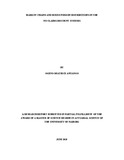| dc.description.abstract | Most NCD systems are unfair to either or both parties. Most systems are that of the simple
random walk model, whereby in case of a claim, the policyholder moves down a discount
level and vice versa. Then there are the extreme cases, whereby if a driver makes claim(s), he
loses all the discounts accumulated over the years and goes back to the level of full premium
payment. The other movements within the NCD systems are those of the in-between cases,
these consider the frequency of claims, and can involve moving few steps back the discount
level in case of claim(s). A fair NCD system, should take into consideration the frequency of
claims and the non-homogeneity factor.
In this paper, we have used the Markov chains to explain the movement between levels and
used the Mixed Poisson distributions to calculate probabilities, with the mixing distributions
being the exponential distribution, the one parameter gamma distribution, the two parameter
gamma distribution and the Lindley distribution. The rules applied in different systems have
been analysed and combined to take into consideration the claims frequency.
The following distributions have been constructed, the Geometric, the Negative Binomial
distribution with one and two parameters, and the Poisson Lindley, and their parameters
estimated using the method of moments and the maximum likelihood method. The
distributions have then been used to fit the claim frequency data and a comparison made with
data from a Poisson – Inverse Gaussian distribution. | en_US |

